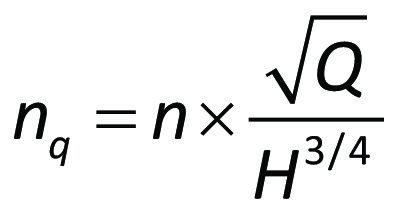3.1.7 Pump specific speed
Pump specific speed
A pump specific speed is an important parameter which is frequently used to describe different pump phenomena, primarily in the case of centrifugal pumps. Pump specific speed is specific speed nq is defined by the following relationship.

where
nq = specific speed
n = actual speed (r/min)
Q = volume flow (m³/s)
H = delivery head (m)
Note that nq is not dimensionless and therefore has different numerical values in SI (metrics) compared with different kinds of systems.
nq can be defined in words as the mechanical speed of a pump identical with the one under consideration, and which with identical velocity vector diagrams gives a volume flow of
1 m3/s at a delivery head of 1 m. All identically shaped pumps have therefore the same specific speed independent of their size. The values of n, Q and H which refer to the pump’s optimum point BEP (Best Efficiency Point) , i.e. where the efficiency is greatest, are to be used in calculating the nq value of a certain pump.
The specific speed is used, among others, for characterising the shape of centrifugal pump impellers. Drawing on experience gained in this field, it is generally possible to estimate which impeller shape will, under normal circumstances, give the best results for a given speed, volume flow and delivery head. Figure 3.11 illustrates this relationship. The axial pump has shown itself to be the most suitable type in the case of, for example, a large volume flow and a small delivery head, i.e. in the case of high specific speed. Axial pumps are herefore said to have high specific speed nq.

Figure 3.11 Pump impellers having different specific speeds
In practice there are several varieties of specific speed. They are, in principle, constructed as nq but due to different systems or different defining components, they can give different numerical values.
